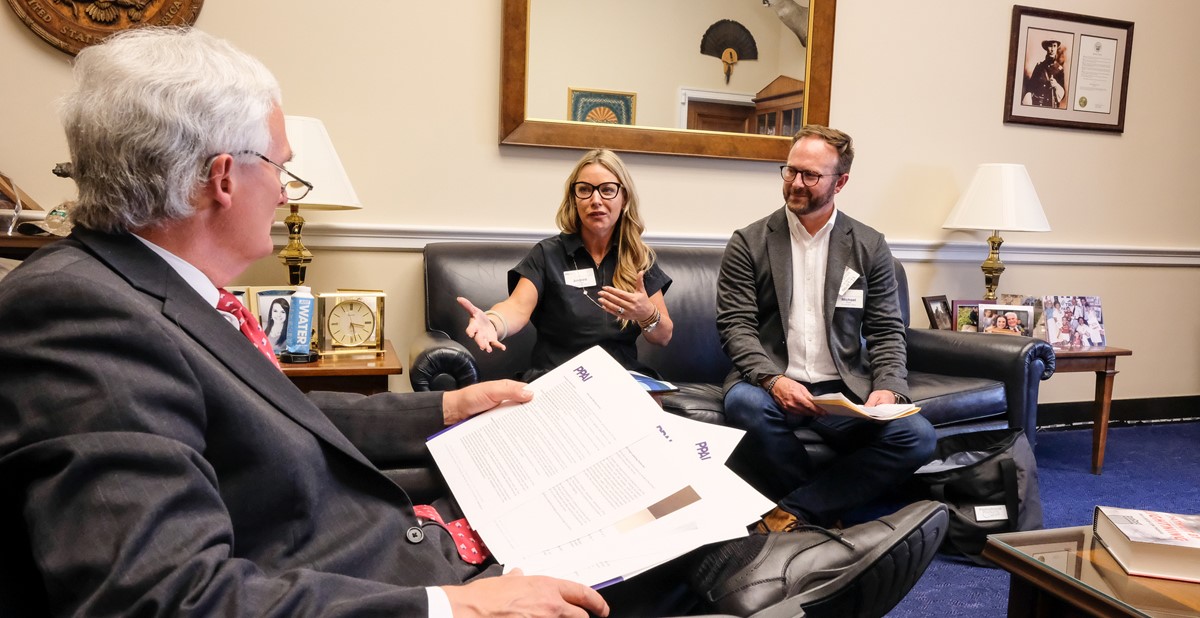Promo’s 4 Messages To Congress During L.E.A.D. 2023

Rep. Bob Latta (R-OH5) reviews PPAI materials during a meeting Wednesday with Andrea Kramer and Michael Steeb of Findlay, Ohio distributor City Apparel.
The resumption of in-person interactions with congresspeople was a welcomed return on Thursday during PPAI’s Legislative Education and Action Day, held live on Capitol Hill for the first time since 2019. But the industry’s talking points on the day also had a familiar feel.
As LEAD’s name suggests, the first objective is always to inform senators and representatives about the size and importance of the promo industry. It represents a $25 billion sales market in the U.S. and employs roughly half a million Americans. Of the industry’s 38,000 companies in the U.S., some 98% are considered small businesses.
Beyond those important figures for representatives to understand, the industry’s advocates drilled down on four primary talking points that have been vital to the industry going back to L.E.A.D. 2022 and earlier. Along with reading material on PPAI’s positions, volunteers left sample products with representatives and their staffs, including Promotional Products Work branded tumblers, hand sanitizer and more.
A mix of regional association representatives from industry companies of all sizes and types, as well as PPAI staffers, L.E.A.D. participants brought up the same key messages in each meeting.
Promotional Products Work
Promotional products are the most cost-effective, memorable and longest-lasting form of advertising, participants told their representatives. The same marketing medium legislators use as part of their election campaigns can make a profound difference in the lives and businesses of constituents. Included in the message:
- Promotional products are ranked the No. 1 most effective form of advertising to prompt action across all generations.
- According to PPAI’s most recent Consumer Study, 88% of people remember the advertiser on a promotional product, and 85% of recipients do business with the advertiser on a promotional product.
Country Of Origin Labeling (COOL) Online Act
The nature of this industry’s complex supply chains and quick orders make compliance with the COOL Online Act (S. 1421) practically impossible. PPAI understands the importance of traceability. The Association has numerous resources available to help its members conduct their own supply chain mapping. However, adhering to these requirements poses challenges relating to dual sourcing, diversifying global supply chains, and fluctuating supply chains.
- It is common for a single SKU number to be applied to multiple products found in different countries, especially in the case of apparel where the same shirt may be dual sourced based on various size or color preferences.
The Industry’s Ask: We appreciate the bipartisan spirit and Congress’ intent to increase visibility into supply chains. PPAI understands and supports transparency as well. We have been educating our members about supply chain mapping and traceability. However, PPAI asks Congress to provide for the flexibility to identify multiple countries of origin for unfinished products sold online.
Independent Contractors
In this industry, salespeople willingly and intentionally choose to be independent contractors instead of employees. Promotional sales consultants have the ability to be their own boss, run their own business, and control their own destiny.
We’re not in the gig economy and we take no issue with a majority of the PRO Act (H.R. 20). Our only concerns with the bill involve the ABC test and the broad definition that classifies all workers as employees. Unlike the members of the gig economy on which similar labor law proposals have focused, the relationship between independent contractors in the promotional products industry and their distributors is mutually beneficial for both parties.
The Industry’s Ask: Uniformly applying the worker reclassification provisions, or ABC test, will have a devastating impact on tens of thousands of jobs and businesses in the promotional products industry, depriving them from earning an income. Our industry is not the focus of the proposed policy change, therefore, we request an exemption.
Global Value Chains
Most of our products’ value is added domestically in pre‐production and post‐production
- Production overseas of the base inputs is where the least amount of value is added. Although some promotional products are manufactured overseas, once in the U.S., these products are decorated and sold by American workers, and used to promote American goods and services.
- At least half of the value of our products is added in the U.S. by American workers. A recent study commissioned by the S. Global Value Chain Coalition found that the U.S. adds as much as 75% value to the final retail price for apparel made overseas.
The Industry’s Ask: Please keep the unique needs and interests of the promotional products industry in mind when considering legislation that impacts the success of our industry, for example trade policy that unintentionally raises costs for small businesses and consumers.

